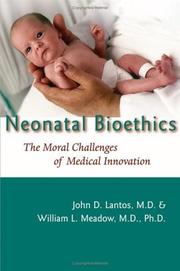| Listing 1 - 1 of 1 |
Sort by
|

ISBN: 080188344X 9780801883446 Year: 2006 Publisher: Baltimore Johns Hopkins university press
Abstract | Keywords | Export | Availability | Bookmark
 Loading...
Loading...Choose an application
- Reference Manager
- EndNote
- RefWorks (Direct export to RefWorks)
Examines the interconnected development of four key aspects of neonatal intensive care. The authors present neonatal bioethics as a paradigm of complex societal conversation among physicians, philosophers, policymakers, judges, and legislators that led to responsible societal oversight of a controversial medical innovation. Neonatal intensive care has been one of the most morally controversial areas of medicine during the past thirty years. This study examines the interconnected development of four key aspects of neonatal intensive care: medical advances, ethical analysis, legal scrutiny, and econometric evaluation. The authors assert that a dramatic shift in societal attitudes toward newborns and their medical care was a stimulus for and then a result of developments in the medical care of newborns. They divide their analysis into three eras of neonatal intensive care. The first, characterized by the rapid advance of medical technology from the late 1960s to the Baby Doe case of 1982, established neonatal care as a legitimate specialty of medical care, separate from the rest of pediatrics and medicine. During this era, legal scholars and moral philosophers debated the relative importance of parental autonomy, clinical prognosis, and children's rights.The second era, beginning with the Baby Doe case (a legal battle that spurred legislation mandating that infants with debilitating birth defects be treated unless the attending physician deems efforts to prolong life "futile"), stimulated efforts to establish a consistent federal standard on neonatal care decisions and raised important moral questions concerning the meaning of "futility" and of "inhumane" treatment. In the third era, a consistent set of decision-making criteria and policies was established. These policies were the result of the synergy and harmonization of newly agreed upon ethical principles and newly discovered epidemiological characteristics of neonatal care. Tracing the field's recent history, notable advances, and considerable challenges yet to be faced, the authors present neonatal bioethics as a paradigm of complex conversation among physicians, philosophers, policy makers, judges, and legislators which has led to responsible societal oversight of a controversial medical innovation.
Neonatal intensive care --- Neonatology --- Intensive Care Units, Neonatal --- History, 20th Century --- Intensive Care, Neonatal --- Moral and ethical aspects --- History --- ethics --- trends --- history --- legislation and jurisprudence --- neonatale intensieve zorg --- soins néonataux intensifs --- History. --- legislation & jurisprudence --- Neonatal pediatrics --- Perinatology --- Newborn infants --- Intensive care, Neonatal --- Intensive care of the newborn --- Newborn intensive care --- Infant health services --- Pediatric intensive care --- Neonatal emergencies --- Hospital care --- Neonatal intensive care - Moral and ethical aspects - United States --- Neonatology - Moral and ethical aspects - United States --- Neonatology - United States - History --- Intensive Care Units, Neonatal - ethics - United States - vase reports --- History, 20th Century - United States - case reports --- Intensive Care Units, Neonatal - trends - United States - case reports --- Intensive Care, Neonatal - ethics - United States - case reports --- Intensive Care, Neonatal - history - United States - case reports --- Intensive Care, Neonatal - legislation and jurisprudence - United States - case reports
| Listing 1 - 1 of 1 |
Sort by
|

 Search
Search Feedback
Feedback About
About Help
Help News
News